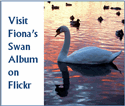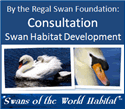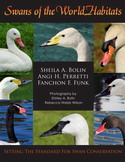Ask the Swan Specialist
Date: 12 October 2014
Hi Tonya:
When our first book went into backorder, the price went to a ridiculous price . That is why we authored an updated publication that provides the exact answers that swan owners and keepers like you need. Our new book, Swans of the World Habitats: Setting the Standard for Swan Conservation is now available for $51.00 (includes shipping and handling) on this site as well as (www.theregalswan.com). We self-published so that we can offer swan keepers and owners a publication that is always affordable.
The book provides information including what to feed, how to shelter, the use of aerators/de-icers to keep ponds open and protect the birds from drowning, starvation and predators. It is a soup to nuts publication that shows you how to set-up and maintain a safe and comfortable habitat for your swans and how to maintain them on a daily basis to include feeding and veterinary care.
Feed the swans poultry layer pellets mixed with cracked corn (not wheat). Too much protein can cause a condition known as angel wing. Provide them with plenty of lettuce, especially during the winter months so that their vegetation needs are met. You can also provide them treats with some bread added to their diet.
If your winters get too severe, you may want to build them a ventilated shelter or use a garage, shed or barn as long as they are not in a draft, free from predators digging under, climbing over or breaking into to access the swans. The flooring should be non-slick straw or other substrate that is not abrasive to their feet and cause bumblefoot or foot/leg injuries. Anything steep can cause leg and foot injuries which can be detrimental to the swans and even be life-threatening if they injury prevents them from exiting or entering the water.
Finally, the swans can stay indoors as long as they are frequently washed down with warm water and allowed to bathe and preen themselves in order to maintain water repellency. If you keep any waterfowl indoors for any length of time and do not allow them to preen to keep the oil on their feathers, they can drown once they are returned to the open water. So, just make sure you water them down once or twice a week with warm water and then more frequently when you are ready to return them back to the pond. Keep their straw or bedding cleaned on a daily basis and free from pests such as rats and ants. Keep freshwater in a bowl with their food submerged in the water for them to eat at will. Clean frequently with fresh water on a daily basis and they will be safe and sound and very warm indoors for the winter months. Shelter is good in the winter not only for the severe cold weather, but also to protect from predators which can access frozen ponds and will hunt during the winter months looking for birds or other animals that are easy prey. By housing the swans indoors, you will help keep them safe from predators especially if they are raised in a captive setting in which they are not familiar with local predators or how to evade them. We hope this information is of benefit. Should you need further information, please do not hesitate to contact us. The Regal Swan
Messages In This Thread
- The care of pinioned swans -- Tonya -- 12 October 2014
- Re: The care of pinioned swans -- The Regal Swan -- 12 October 2014
Ask the Swan Specialist is powered by
Tetra-WebBBS 5.30 Beta © 2006-2007 Tetra-Team






